Makhmudov, Sharshenbekov continue Kyrgyzstan's meteoric rise with Asian Games golds
Wednesday, October 4, 2023 - 17:56 By Vinay Siwach

LIN'AN, Hangzhou, China (October 4) -- At the 2018 Asian Games, Kyrgyzstan was expected to open its gold medal account from wrestling. Akzhol MAKHMUDOV (KGZ), the then Asian champion, was the hero of the wrestling-mad nation and in the 77kg final. However, he fell to Mohammadali GERAEI (IRI) in the 77kg final.
At the 19th Asian Games in Hangzhou on Wednesday, Makhmudov did not disappoint. Although it was not Kyrgyzstan's first gold medal of the game, world champs Makhmudov and Zholaman SHARSHENBEKOV (KGZ) ended the nation's long wait for a second gold medal in this edition of the Asian Games in which it won the first gold on September 24.
Both the Kyrgyzstan superstars were in action Wednesday in Lin'an Sports and Culture Exhibition Center in Hangzhou, China as wrestling got underway at the 19th Asian Games with four Greco-Roman weights.
Apart from Makhmudov and Sharshenbekov, Katsuaki ENDO (JPN) and Jalgasbay BERDIMURATOV (UZB) captured the remaining two gold medals. Berdimuratov's gold was Uzbekistan's fourth in the history of Asian Games history.
 Akzhol MAKHMUDOV (KGZ) defeated Amin KAVIYANINEJAD (IRI) in the 77kg final to win the gold medal. (Photo: UWW / Sachiko Hotaka)
Akzhol MAKHMUDOV (KGZ) defeated Amin KAVIYANINEJAD (IRI) in the 77kg final to win the gold medal. (Photo: UWW / Sachiko Hotaka)
Wrestling against an Iranian wrestler in the final again, Makhmudov took a cautious approach and controlled the bout for six minutes against Amin KAVIYANINEJAD (IRI).
The two-time world champion from Kyrgyzstan, who won his second world title just 10 days ago in Belgrade, struggled with some fatigue and discomfort in his knee during the day. But he managed to navigate his quarterfinal against Sophak KEO (CAM) with a fall and defeated Azat SADYKOV (KAZ) 9-0 in the semifinal.
Kaviyaninejad took out former Asian Games champion Hyeonwoo KIM (KOR) in his opening bout before winning his quarterfinal against Dilshod OMONGELDIYEV (UZB). A tough semifinal against Rui LIU (CHN) saw him hang on to a 1-1 win.
In the final Makhmudov, like the World Championships, did not try any flamboyant actions and was happy to give up par terre in the first period. Kaviyaninejad failed to turn his Kyrgyz opponent. When Makhmudov got the par terre advantage and the 1-1 criteria lead, Kaviyaninejad managed to defend as well.
Makhmudov defended his 1-1 criteria lead as the clock expired and he won his first-ever Asian Games gold medal. He had won the World Championships final with a 1-1 scoreline as well.
As usual, Makhmudov did not celebrate his gold medal beyond acknowledging the few Kyrgyzstan fans in the crowd. He would later say that he is not feeling any joy.
“Honestly, I have no emotions now,” Makhmudov said. “The only thing I really want is the gold medal in Paris. For now, I don't feel any happiness.”
Makhmudov suffered a 2-1 loss in the Tokyo Olympics final, finishing with a silver medal and falling short of becoming Kyrgyzstan's first-ever Olympic champion in any sport. Yet, Kyrgyzstan fell in love with the shark-singlet-wearing wrestler. Having already won the 2024 Paris Olympic quota for Kyrgyzstan, and being the first choice to go, Makhmudov is in no mood to finish second this time.
“I think I will do my best [till Paris],” he said. “We will discuss with the coaches and I will do ten out of ten.”
The 24-year-old also played down his knee injury, saying that the pain has reduced, but did express the difficulties of wrestling at two big events in two weeks.
“Definitely it was very difficult [to wrestle back-to-back events],” he said. “The hardest part was the weight cut and after the World Championships, it was difficult for me to recover.”
 Zholaman SHARSHENBEKOV (KGZ), red, pins Ayata SUZUKI (JPN) in the 60kg final. (Photo: UWW / Sachiko Hotaka)
Zholaman SHARSHENBEKOV (KGZ), red, pins Ayata SUZUKI (JPN) in the 60kg final. (Photo: UWW / Sachiko Hotaka)
Sharshenbekov expressed similar views but that was after he also won the gold medal like Makhmudov which was perhaps the reason for the 60kg world champion struggling in his opening bout against Aslamjon AZIZOV (TJK). He gave up five points to the Tajik but won 8-5. He then moved past Asian silver medalist Hanjae CHUNG (KOR) 9-0 in a rematch of this year's Asian Championships final.
Islomjon BAKHRAMOV (UZB) was pinned by Sharshenbekov, 10 days after winning 9-0 in the World Championships quarterfinals.
From the other side of the bracket, Ayata SUZUKI (JPN) made it to the final with wins over Thanwa SUTDI (THA), Seung RI (PRK) and Aidos SULTANGALI (KAZ).
Both came out flying and Sharshenbekov got the first big lift. He failed to make the most of it but scored two points. Suzuki landed on Sharsenbekov's chest to earn two points as well. He then showed intent and launched a four-pointer to lead 6-2.
Sharshenbekov replied with an underhook and held Suzuki's back to the mat, securing the fall. Suzuki challenged for a leg four but it was declared clean. The pin ended the bout in two minutes and 34 seconds.
“I the Japanese wrestler is very strong but he is a very comfortable opponent for me,” Sharshenbekov said.
Incidentally, Sharshenbekov defeated Olympic silver medalist Kenichito FUMITA (JPN) in the World Championships final in Belgrade after an equally stunning first period.
The turnaround from the World Championships to the Asian Games was a challenge for Sharshenbekov but he said he was prepared to win.
“I cut around eight kilograms for each competition,” Sharshenbekov said. “Every sport has its own difficulties and wrestling also. The process of cutting weight was incredibly challenging. However, right after the World Championships, I shifted my focus to the Asian Games. Despite all the hardships, I'm thrilled to have won the gold medal here. This is not the end of my journey. With God's guidance, I am planning to prepare for the Olympics and aim to bring home the gold medal for Kyrgyzstan."
Wrestling Fumita and Suzuki in the space of 10 days did break different sets of challenges for Sharshenbekov who said that he was up for both the Japanese wrestlers.
"Fumita is a great athlete who consistently ranks in the top five of the world," he said. "He is an exceptionally strong wrestler, which is why our coaches devised an effective strategy. I believe we showed good wrestling. Suzuki is also a talented wrestler. The match against him was far from easy, particularly considering that I had just competed in the World Championships."
Suzuki reflected on the final saying that he needs to work on the areas which made his lose even after leading 6-2.
“At the end, I made a misjudgment,” he said. “I knew the opponent [Sharshenbekov] is good in attacking from the side and I did well till 6-2. But I let him close the gap and win.”
 Katsuaki ENDO (JPN), second from left, won the 67kg gold medal for Japan. (Photo: UWW / Sachiko Hotaka)
Katsuaki ENDO (JPN), second from left, won the 67kg gold medal for Japan. (Photo: UWW / Sachiko Hotaka)
His Japan teammate Endo made sure he didn't slip up in the 67kg final, winning 4-3 against Meiirzhan SHERMAKHANBET (KAZ).
“Since I was chosen for these Games, I was going to win,” Endo said. “To be honest, when I saw the draw, I thought I could win this.”
And the former U23 world champion began his confident run with a 9-0 win over Firuz MIRZORAJABOV (TJK) in the opening bout, won 5-1 against Razzak BEISHEKEEV (KGZ) in the quarterfinals and defeated Mahmud BAKHSHILLOEV (UZB), 6-1, to reach the final against Shermakhanbet who was on song as well, marking his return to a major competition in more than one year with a silver medal.
After opening with a 10-0 win over Nuttapong HINMEE (THA), Shermakhanbet was involved in a thriller against home favorite Lei LI (CHN). Taking a 10-7 lead with two four-point throws, Shermakhanbet gave up a stepout and Li scored a takedown to lead 10-10 on criteria but Kazakhstan challenged the call and it was called a slip and the score was reversed to 10-8 which gave Kazakhstan the win.
If that close bout was not enough, Shermakhanbet pinned Danial SOHRABI (IRI) after trailing 9-2 in the semifinals. While Sohrabi was trying to defend a turn from par terre by standing up, Shermakhanbet locked Sohrabi's right hand and strangled him for space, putting the Iranian back on the mat for the pin.
However, there was no such comeback in the final against Endo after trailing 4-1. Endo scored a correct throw from par terre to lead 3-0. Japan challenged, asking for four points but lost, giving one point to Shermakhanbet.
In the second period, Endo gave up a stepout and passivity point but still held a 4-3 lead, the final score of the gold-medal bout.
“I trained with very strong opponents in my club back home, I didn't feel he [Shermakhanbet] has the same power,” Endo said about the Kazakhstan wrestler.
Endo's immediate goal is to win the Emperor's Cup in December which will give him the opportunity to wrestle at the Asian Olympic Qualifier in April 2024 in Bishkek and earn a 2024 Paris Olympic quota for Japan at 67kg.
Shermakhanbet will also look to secure the Olympic quota for Kazakhstan but like Endo, he will have to win the right to compete in Bishkek.
"I only returned to the training process three months ago," Shermakhanbet said. "It is indeed very challenging to compete after a long pause. I need more time to get back in shape. At the beginning of the next year, we have our national championships, and we'll see how that goes."
 Jalgasbay BERDIMURATOV (UZB), blue, throws Naser ALIZADEH (IRI) during the 87kg final. (Photo: UWW / Sachiko Hotaka)
Jalgasbay BERDIMURATOV (UZB), blue, throws Naser ALIZADEH (IRI) during the 87kg final. (Photo: UWW / Sachiko Hotaka)
The first day of wrestling closed out as Berdimuratov avenged his 2022 Asian Championships loss to Naser ALIZADEH (IRI) with a 7-4 win. Berdimuratov led 7-0 at the break, thanks to penalty points against Alizadeh but gave up four including caution points. But he held on to win his first Asian Games gold and the fourth for Uzbekistan in Greco-Roman Asian Games history.
The gold has also kept Uzbekistan in the top five of the overall medals tally in Hangzhou as it has 16 gold medals on Wednesday.
 Jalgasbay BERDIMURATOV (UZB), second from left, along with the other medalist in 87kg, Naser ALIZADEH (IRI), left, Masato SUMI (JPN), right, and Sunil KUMAR, second from right. (Photo: UWW / Sachiko Hotaka)
Jalgasbay BERDIMURATOV (UZB), second from left, along with the other medalist in 87kg, Naser ALIZADEH (IRI), left, Masato SUMI (JPN), right, and Sunil KUMAR, second from right. (Photo: UWW / Sachiko Hotaka)
RESULTS
Greco-Roman
60kg
GOLD: Zholaman SHARSHENBEKOV (KGZ) df. Ayata SUZUKI (JPN), via fall (7-6)
BRONZE: Se ung RI (PRK) df. Aidos SULTANGALI (KAZ), 2-1
BRONZE: Hanjae CHUNG (KOR) df. Islomjon BAKHRAMOV (UZB), 5-4
67kg
GOLD: Katsuaki ENDO (JPN) df. Meiirzhan SHERMAKHANBET (KAZ), 4-3
BRONZE: Razzak BEISHEKEEV (KGZ) df. Mahmud BAKHSHILLOEV (UZB), 1-1
BRONZE: Danial SOHRABI (IRI) df. Lei LI (CHN), 3-2
77kg
GOLD: Akzhol MAKHMUDOV (KGZ) df. Amin KAVIYANINEJAD (IRI), 1-1
BRONZE: Rui LIU (CHN) df. Hyeonwoo KIM (KOR), 5-3
BRONZE: Azat SADYKOV (KAZ) df. SOPHAK KEO (CAM), via inj. def.
87kg
GOLD: Jalgasbay BERDIMURATOV (UZB) df. Naser ALIZADEH (IRI), 7-4
BRONZE: Masato SUMI (JPN) df. Maksat SAILAU (KAZ), 9-1
BRONZE: Sunil KUMAR df. A. AZISBEKOV (KGZ), 2-1

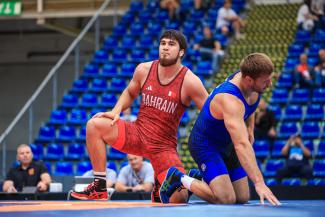
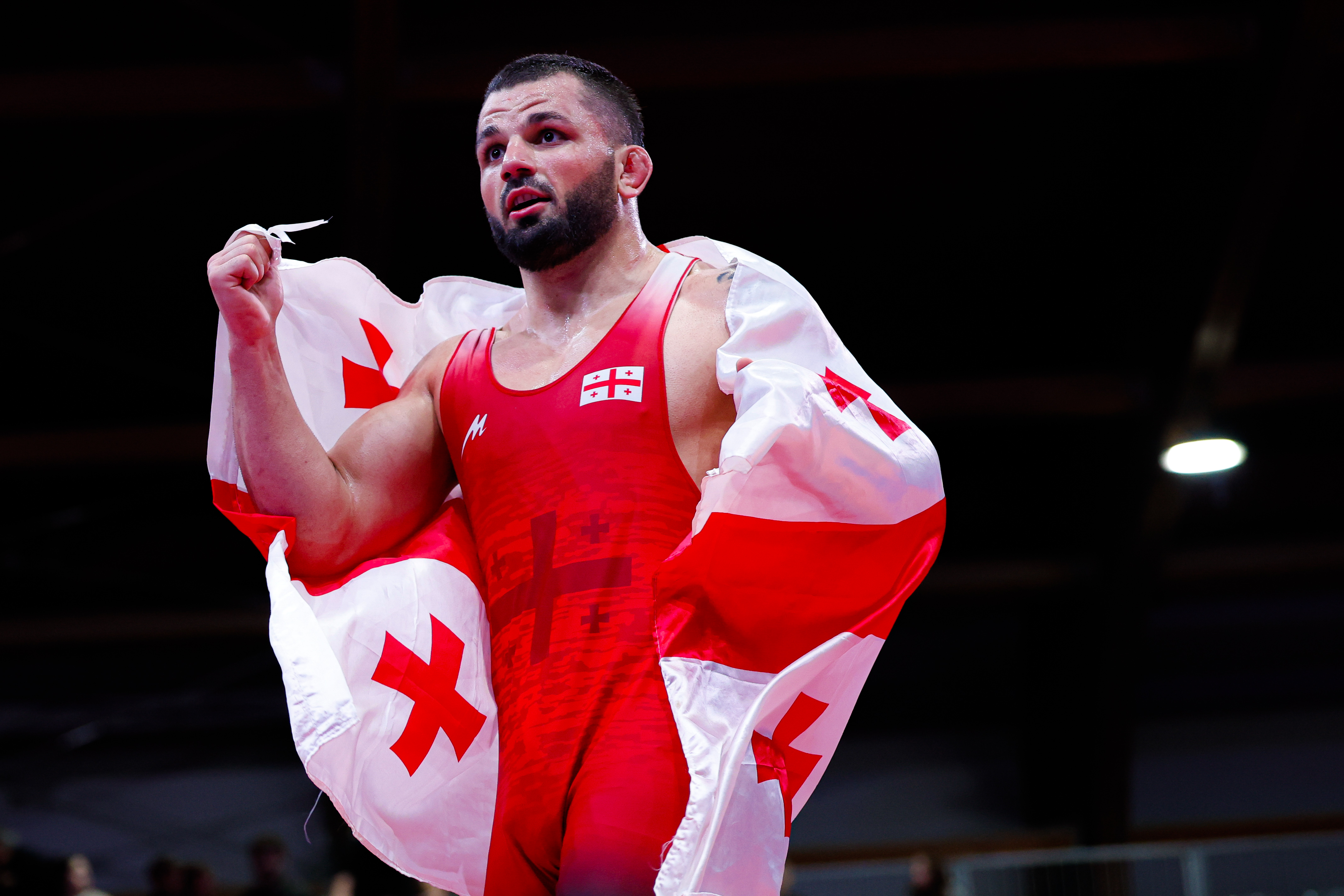 Givi MATCHARASHVILI (GEO) is a three-time European champion. (Photo: United World Wrestling / Kostadin Andonov)
Givi MATCHARASHVILI (GEO) is a three-time European champion. (Photo: United World Wrestling / Kostadin Andonov)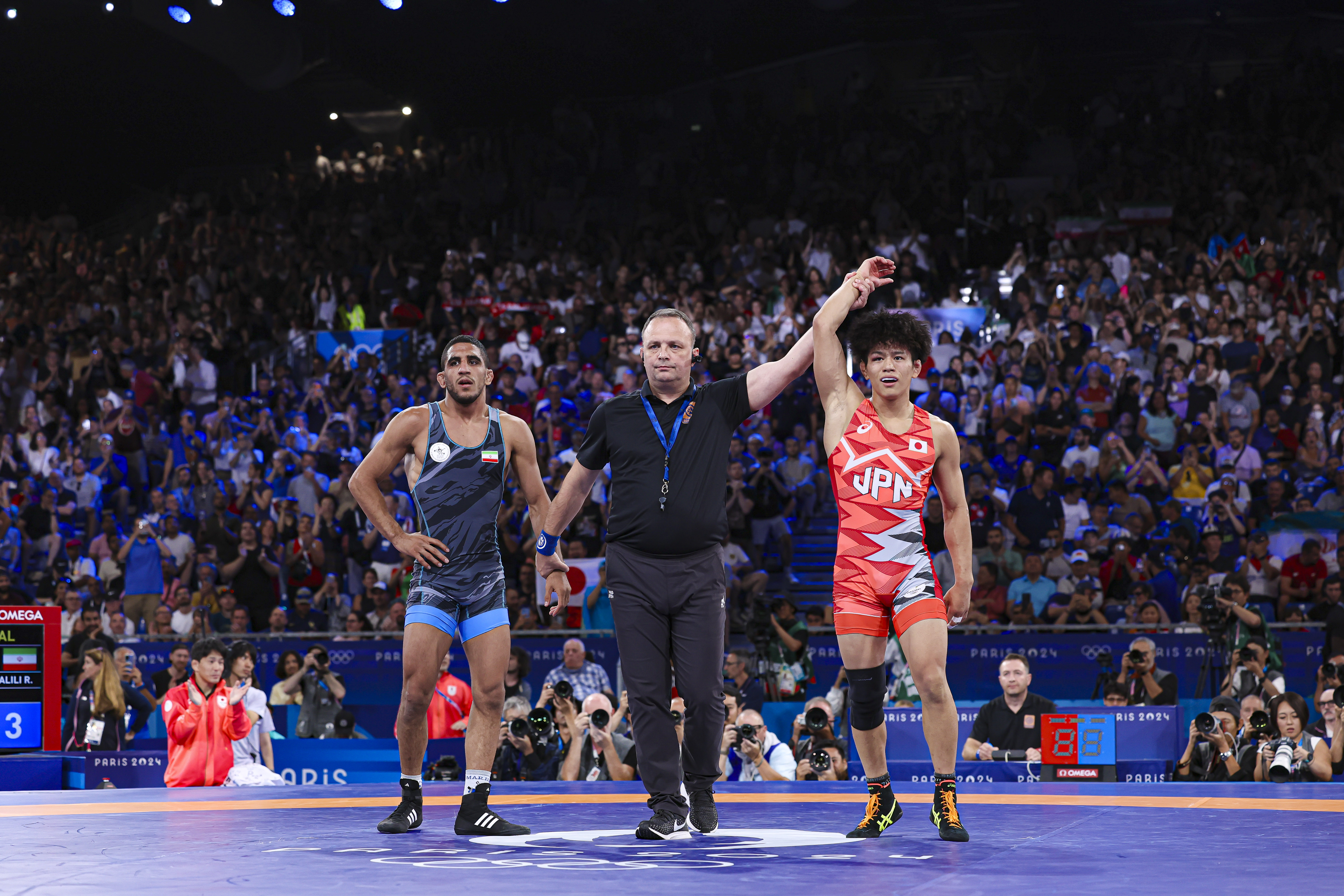 Kotaro KIYOOKA (JPN) defeated Rahman AMOUZAD (IRI) in the 65kg Olympic final. (Photo: United World Wrestling / Kadir Caliskan)
Kotaro KIYOOKA (JPN) defeated Rahman AMOUZAD (IRI) in the 65kg Olympic final. (Photo: United World Wrestling / Kadir Caliskan)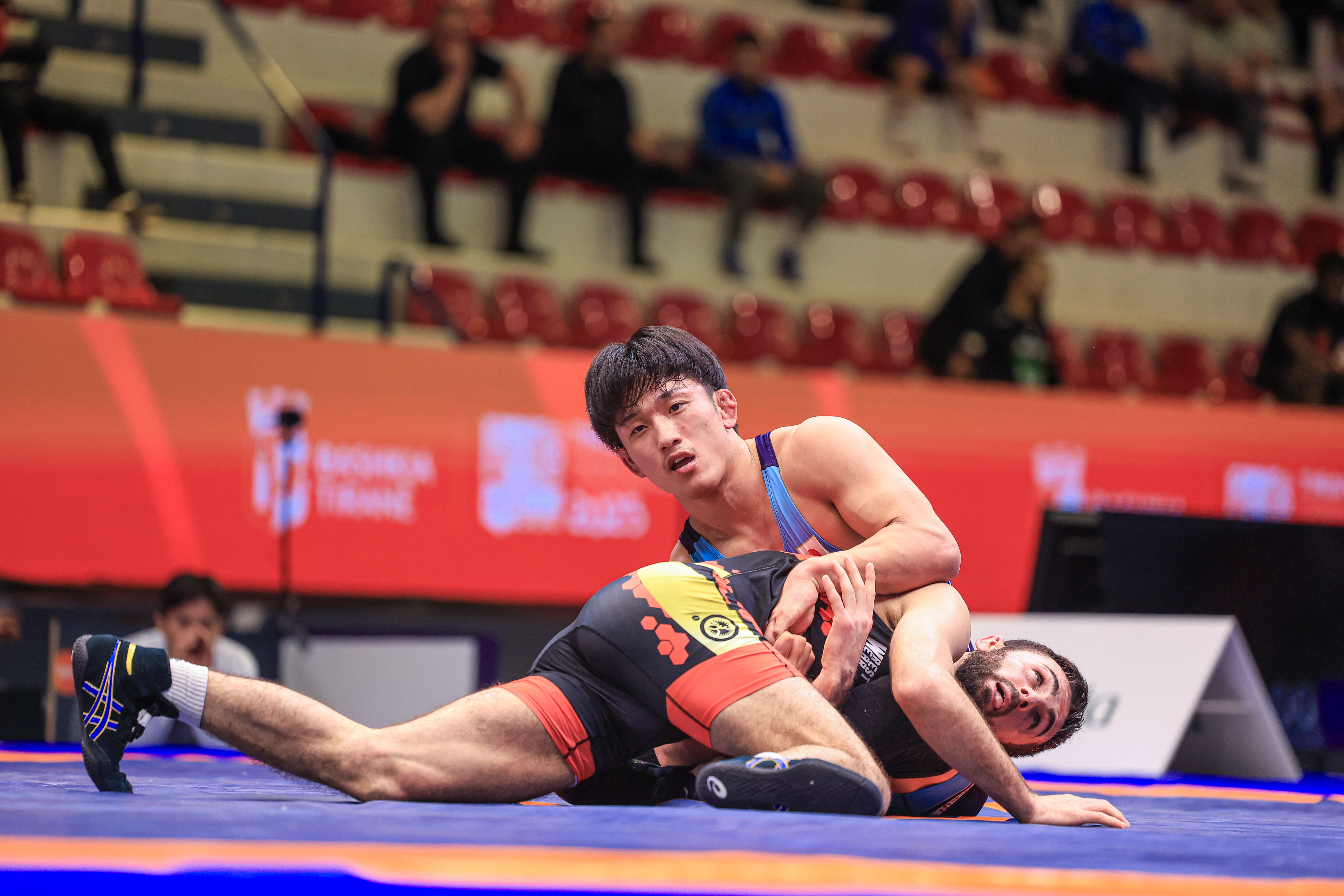 Takara SUDA (JPN) is the Asian champion at 61kg. (Photo: United World Wrestling / Amirreza Aliasgari)
Takara SUDA (JPN) is the Asian champion at 61kg. (Photo: United World Wrestling / Amirreza Aliasgari)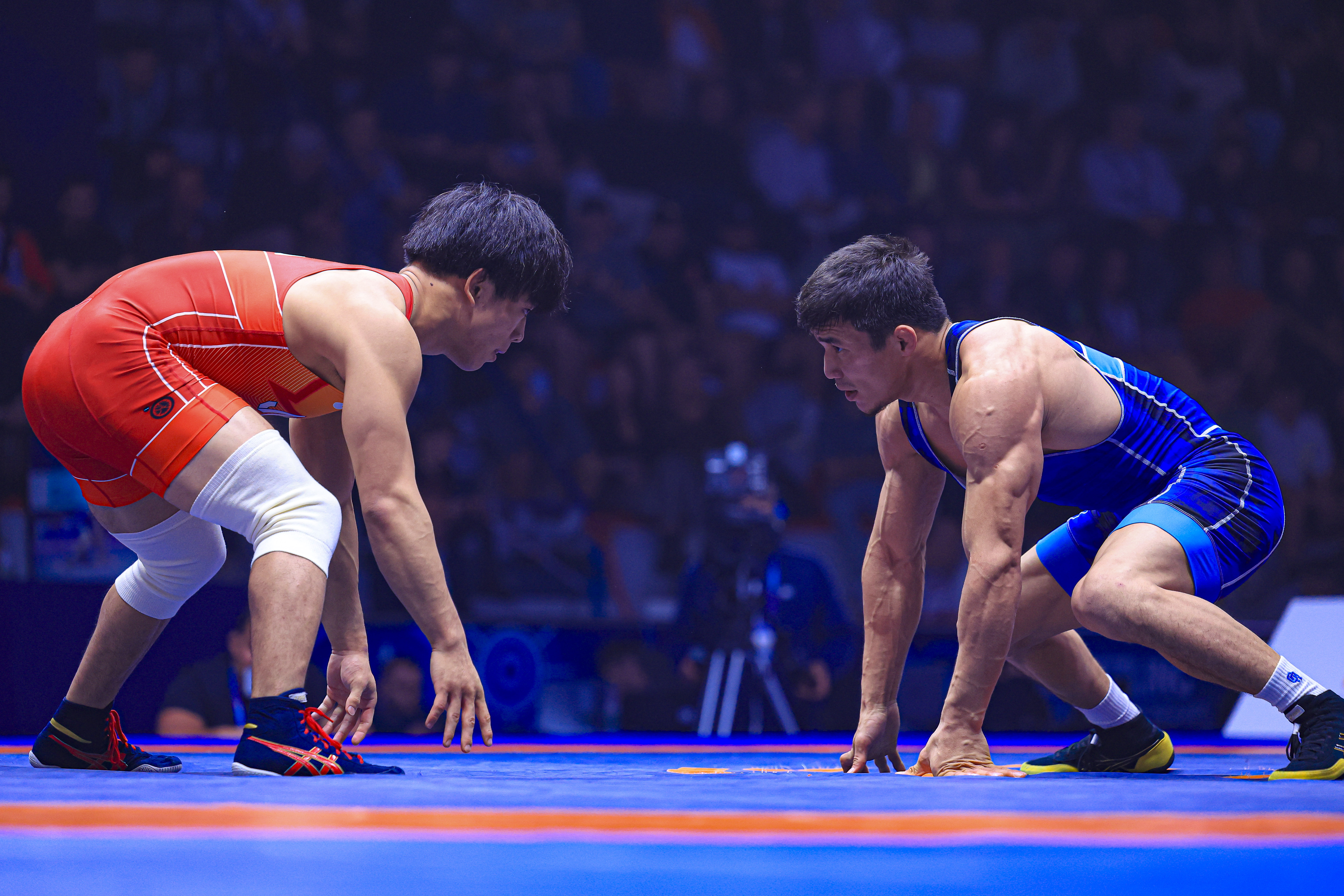 Nurkozha KAIPANOV (KAZ), blue, and Yoshinosuke AOYAGI (JPN) wrestled in the 70kg final at 2024 World Championships. Kaipanov won gold. (Photo: United World Wrestling / Kadir Caliskan)
Nurkozha KAIPANOV (KAZ), blue, and Yoshinosuke AOYAGI (JPN) wrestled in the 70kg final at 2024 World Championships. Kaipanov won gold. (Photo: United World Wrestling / Kadir Caliskan)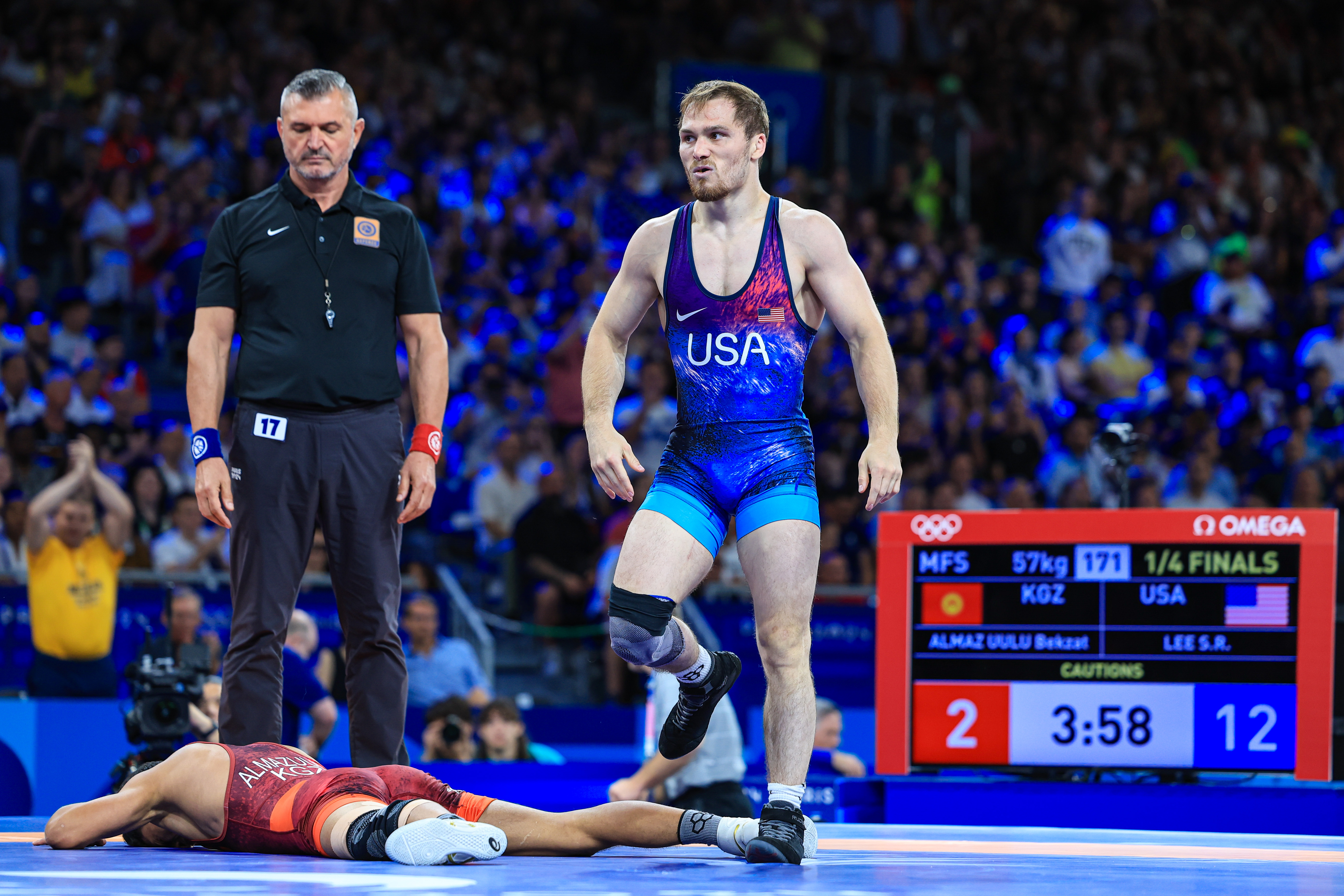 Olympic silver medalist Spencer LEE (USA) is chasing his first world title at 57kg. (Photo: United World Wrestling / Amirreza Aliasgari)
Olympic silver medalist Spencer LEE (USA) is chasing his first world title at 57kg. (Photo: United World Wrestling / Amirreza Aliasgari)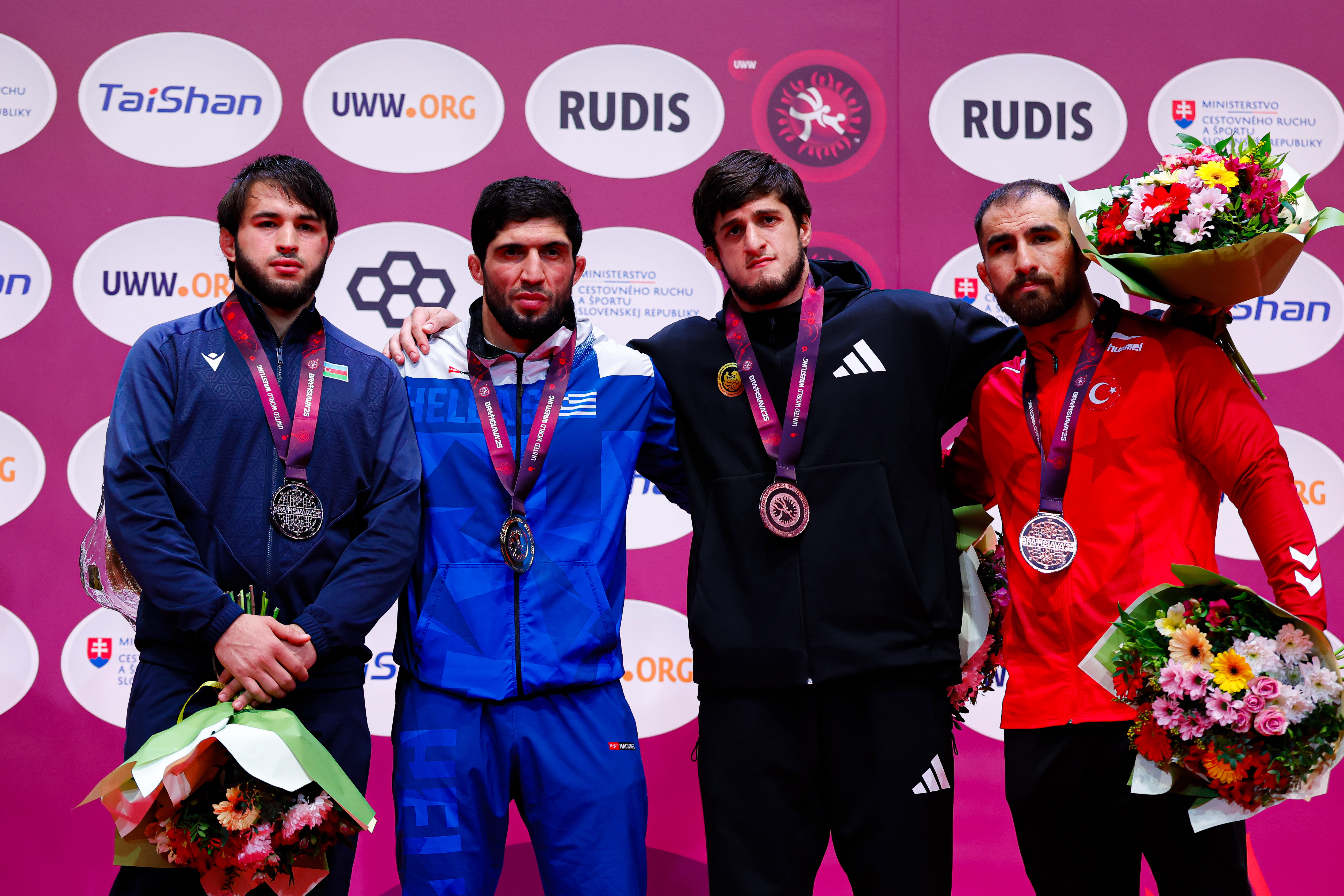 All four 2025 European Championships medalist Osman NURMAGOMEDOV (AZE), left, Dauren KURUGLIEV (GRE), second from left, Miriani MAISURADZE (GEO), third from left, and Feyzullah AKTURK (TUR) are medal threats in Zagreb. (Photo: United World Wrestling / Kostadin Andonov)
All four 2025 European Championships medalist Osman NURMAGOMEDOV (AZE), left, Dauren KURUGLIEV (GRE), second from left, Miriani MAISURADZE (GEO), third from left, and Feyzullah AKTURK (TUR) are medal threats in Zagreb. (Photo: United World Wrestling / Kostadin Andonov)
Share your thoughts.
Comments